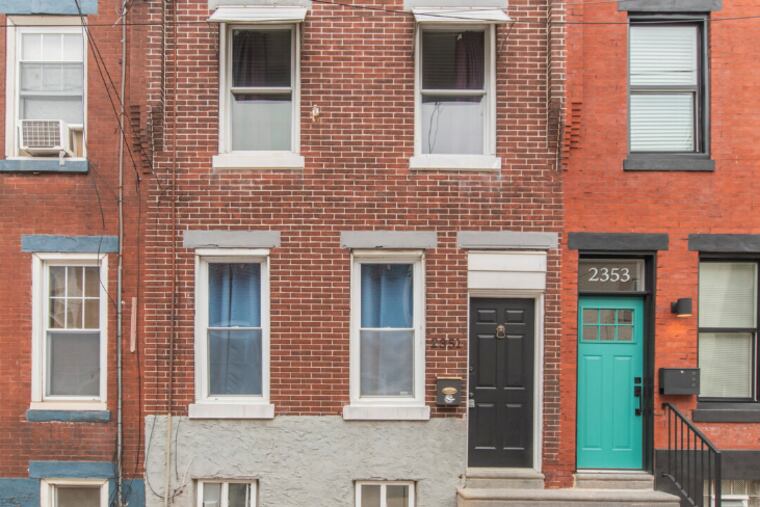A yard and an extra bathroom: Dreams for small housing dwellers — at least until the pandemic passes
With stay-at-home orders in place, people in small apartments can feel the effects of cabin fever faster and more acutely, making practical changes, such as decluttering, more important.

On a normal day — that is to say, pre-pandemic — living in a small apartment, a place that commands minimalism, could be inconvenient. For people now cramped in tight quarters under stay-at-home orders necessitated by the coronavirus pandemic, what once seemed charming in its coziness is no more.
It’s annoying.
“There is a feeling of being trapped,” said Allison Fegel, a real estate agent for Philly Home Girls, a female-run company in East Kensington. People are saying, “We need more space; we need more green.”
From 300-square-foot Rittenhouse Square condominiums to apartments just barely double that size, “people are able to accommodate their space as well as they can,” said Lisette Tarragano, another real estate agent at Philly Home Girls. “If they didn’t lose their job, or if they have but can maintain where they are, they’re staying or they’re not.”
» READ MORE: ‘This just isn’t the right time’: Coronavirus delays Philly’s busy spring housing market
More outdoor space, extra natural light, and another bathroom were among the elements of what residents yearned for while sequestered in tight dwellings, according to 1,300 homeowners and renters who took a survey published by realtor.com in late April.
“After more than a month of stay-at-home orders, it’s safe to say Americans are really getting to know what home features work and don’t work for their families,” Nate Johnson, chief marketing officer for realtor.com, said in a statement.
It is, in Fegel’s parlance, “a change in requirements.”
“A client that I’m working with right now who’s moving back to the Philadelphia area lives in a city right now and has told me that they want to be in a Center City neighborhood,” she said. “But since they’ve been shut in, they’ve decided they actually would rather be in a near suburb with more space and some outdoor space. Their requirements kind of flipped. And that’s really just since the shutdown, and they’ve been at home with their daughter, shut in.”
For people unable to move during the global pandemic, among the most ambitious of realtor.com’s survey respondents — ostensibly, also the most frustrated — 32% said they had started a home improvement project on their own, according to the survey. Another 15% said they planned to do the same.
» READ MORE: Stressed by pandemic, 43% of Americans turn to ‘comfort buying,’ survey finds
Others have decided renovations aren’t enough.
“I had a family in Fishtown that contacted me," Fegel said. “They said they were going to invest in some renovations to their property. But since the shutdown and being shut into their little house, they’ve decided they actually want a larger home in the Northwest or the Mount Airy area."
Philadelphia falls in between a list of U.S. cities with apartments offering either the least or most amount of space per resident in an apartment, according to RentCafe, a national apartment listing service.
» HELP US REPORT: Are you a health care worker, medical provider, government worker, patient, frontline worker or other expert? We want to hear from you.
After dividing the average apartment size by the average number of people renting in a given city, the results showed apartment dwellers in Santa Ana, Calif., had the least amount of space, with 292 square feet per person. Fremont, Calif., was next, at 318, followed by Brooklyn, at 329.
Louisville, Ky., offered the most space per resident, at 731 square feet, followed by Winston-Salem, N.C., at 723.
The national average was 526 square feet per apartment resident.
In Philadelphia, 650 square feet or less for a one-bedroom apartment is not unusual, Tarragano said.
“Believe it or not, that’s the typical space for a one-bedroom,” she said. "I know, that sounds really small.”
Smaller changes, such as cleaning, decluttering, rearranging furniture, or redecorating, Fegel said, are popular alternatives to home renovations or moving.
“Organization and storage is really important in small spaces," she said. “... People in smaller spaces are feeling really cooped up right now."
Aside from cosmetic changes to the home, such changes can be therapeutic, said Kate Sobon, a licensed professional counselor at In Between The Lines Therapy in Philadelphia.
“The current quarantine due to the COVID-19 pandemic is directly impacting our mental well-being," she said, an effect that could be amplified in people struggling with anxiety, depression, and other mental-health conditions.
Many people could experience mild mental and emotional discomfort spending most days inside, she said, but for those living in smaller spaces, perhaps with their families, significant others, or roommates, they could be likely to feel more volatile emotions and swing between feelings of sadness, frustration, irritation, restlessness, lethargy, and loneliness.
» READ MORE: What you need to know about moving during the coronavirus pandemic
“It is salient to our mental health that our homes allow us to feel relaxed and promote a sense of tranquility,” Sobon said, noting that carving out any space to practice mental, emotional, and physically stimulating activities like reading, meditating, or exercising could prove effective for coping with difficult emotions.
And until the stay-at-home orders lift — in Philadelphia, not anytime soon — “being clean, being minimal, being organized are probably the key first things to staying sane,” Fegel said, “and feeling like you have more space than maybe you do."